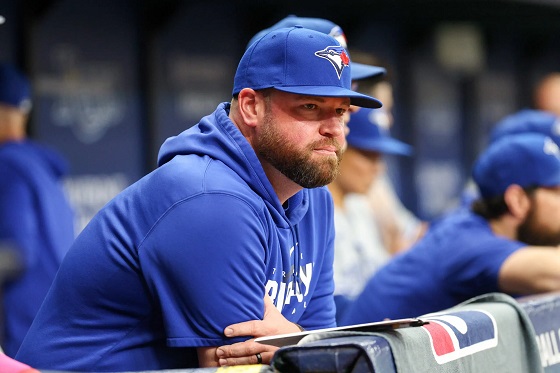Uncategorized
Saudi prosecutor seeks death penalty in Khashoggi killing

DUBAI, United Arab Emirates — Saudi Arabia’s top prosecutor said Thursday he would seek the death penalty for five men charged with the killing of journalist Jamal Khashoggi in Turkey, while the United States moved to sanction 17 Saudi officials it said were involved in the slaying.
The Saudi announcement appeared aimed at distancing the killers and their operation from the kingdom’s leadership, including Crown Prince Mohammed bin Salman, amid a global outcry over the writer’s death.
Also on Thursday, Saudi Arabia’s foreign minister said the crown prince had “absolutely” nothing to do with Khashoggi’s death.
The U.S. Treasury Department, meanwhile, announced it was imposing sanctions on 17 Saudi officials who it said were responsible for or complicit in the killing. Among those targeted for sanctions are Saud al-Qahtani, who was one of the crown prince’s closest aides, and Mohammed al-Otaibi, the diplomat in charge of the Saudi Consulate in Istanbul where Khashoggi was killed Oct. 2. Also named is Maher Mutreb, who was part of the crown prince’s entourage on trips abroad.
With the kingdom facing mounting international pressure, prosecutors have pointed the finger at some members of the crown prince’s inner circle but stopped short of accusing them of ordering Khashoggi’s killing. Those closest to the prince are instead accused of ordering Khashoggi’s forced return in an operation that the Saudis allege went awry.
In a news conference, Sheikh Shalan al-Shalan, the deputy attorney general, said the killing was ordered by an individual whom he did not identify but said was responsible for negotiating Khashoggi’s return back to Saudi Arabia from Istanbul. The individual was part of a 15-man team that was made up of negotiators, intelligence officers and logistics officials.
Al-Shalan said that on the morning of Oct. 2, the leader of the negotiating team saw that he would not be able to force Khashoggi to return, “so he decided to kill him in the moment.”
This appears to contradict a previous Saudi statement quoting Turkish intelligence as saying the killing had been premeditated.
Chief prosecutor Saud Al-Mojeb said that of the 21 people in custody, 11 have been indicted and referred to trial, and that he would seek the death penalty against five of the suspects.
Khashoggi’s killers set their plans in motion on Sept. 29, the prosecutor said, adding that the killers drugged and killed the writer in the consulate before dismembering the body and handing it over for disposal by an unidentified local collaborator. The body has not been found.
It’s not unusual for a Saudi prosecutor to announce he would seek the death penalty before a trial.
The latest Saudi account failed to appease officials in Turkey, who insist the killing and its
“We did not find some of his explanations to be satisfactory,” Turkey’s Foreign Minister Mevlut Cavusoglu said after the Saudi announcement.
“Those who gave the order, the real perpetrators need to be revealed. This process cannot be closed down in this way,” he added.
The Turkish government is demanding the suspects be put on trial in Turkey.
The death of Khashoggi, a Washington Post columnist who had been critical of the crown prince, sent shock waves around the world and led analysts and officials to believe a sensitive operation of this magnitude could not have been carried out without the prince’s knowledge.
Hours after the prosecutor’s announcement, Saudi Foreign Minister Adel al-Jubeir told reporters the crown prince had nothing to do with the killing.
“His royal highness the crown prince has nothing to do with this issue,” he said.
Al-Jubeir said the kingdom is investigating and holding those responsible to account “to make sure this doesn’t happen again.”
“Sometimes mistakes happen … sometimes people exceed their authority,” he said.
Through a series of orchestrated leaks, including audio of the killing shared with Western intelligence, Turkey has tried to keep pressure on the crown prince, who sees Turkey as a regional rival.
Turkey alleges that among those sent to Istanbul was a forensics expert.
In an apparent reference this specialist, al-Shalan said the organizer of the operation called on a specialist to be part of the team to erase evidence if Khashoggi needed to be forcibly returned to Saudi Arabia. Prosecutors said this specialist was working without the direct knowledge of his boss.
Among the high-level officials incriminated in connection with the killing is former deputy intelligence chief Ahmed al-Assiri, who was fired after the killing.
Al-Assiri, believed to have been a close confidant of Prince Mohammed, and former royal court adviser al-Qahtani are accused of planning and ordering Khashoggi’s forced return to Saudi Arabia. Prosecutors say the men formed the 15-man Saudi team sent to carry out the operation.
Saudi prosecutors said the men deemed Khashoggi a threat because of his work as a writer and because he was allegedly backed by groups and countries that are hostile to Saudi Arabia.
However, Saudi prosecutors stopped short of accusing al-Assiri or al-Qahtani of ordering the killing itself, further distancing the killers from the crown prince’s inner circle and bolstering Saudi assertions that the killing was carried out by rogue agents who exceeded their authority.
Khashoggi had been living in self-imposed exile abroad for nearly a year. He was especially critical of the crown prince, who has been leading a wide-reaching crackdown on activists and critics in the kingdom since last year.
Khashoggi had gone to the consulate in Istanbul to obtain documents for his upcoming marriage. His Turkish fiancee waited outside and first raised the alarm about his disappearance.
___
This story has been corrected to fix the spelling of the first name of the top Saudi prosecutor and to say that he did not hold the press conference, his spokesman did.
Aya Batrawy, The Associated Press
Uncategorized
Cost of bureaucracy balloons 80 per cent in 10 years: Public Accounts

The cost of the bureaucracy increased by $6 billion last year, according to newly released numbers in Public Accounts disclosures. The Canadian Taxpayers Federation is calling on Prime Minister Mark Carney to immediately shrink the bureaucracy.
“The Public Accounts show the cost of the federal bureaucracy is out of control,” said Franco Terrazzano, CTF Federal Director. “Tinkering around the edges won’t cut it, Carney needs to take urgent action to shrink the bloated federal bureaucracy.”
The federal bureaucracy cost taxpayers $71.4 billion in 2024-25, according to the Public Accounts. The cost of the federal bureaucracy increased by $6 billion, or more than nine per cent, over the last year.
The federal bureaucracy cost taxpayers $39.6 billion in 2015-16, according to the Public Accounts. That means the cost of the federal bureaucracy increased 80 per cent over the last 10 years. The government added 99,000 extra bureaucrats between 2015-16 and 2024-25.
Half of Canadians say federal services have gotten worse since 2016, despite the massive increase in the federal bureaucracy, according to a Leger poll.
Not only has the size of the bureaucracy increased, the cost of consultants, contractors and outsourcing has increased as well. The government spent $23.1 billion on “professional and special services” last year, according to the Public Accounts. That’s an 11 per cent increase over the previous year. The government’s spending on professional and special services more than doubled since 2015-16.
“Taxpayers should not be paying way more for in-house government bureaucrats and way more for outside help,” Terrazzano said. “Mere promises to find minor savings in the federal bureaucracy won’t fix Canada’s finances.
“Taxpayers need Carney to take urgent action and significantly cut the number of bureaucrats now.”
Table: Cost of bureaucracy and professional and special services, Public Accounts
| Year | Bureaucracy | Professional and special services |
|
$71,369,677,000 |
$23,145,218,000 |
|
|
$65,326,643,000 |
$20,771,477,000 |
|
|
$56,467,851,000 |
$18,591,373,000 |
|
|
$60,676,243,000 |
$17,511,078,000 |
|
|
$52,984,272,000 |
$14,720,455,000 |
|
|
$46,349,166,000 |
$13,334,341,000 |
|
|
$46,131,628,000 |
$12,940,395,000 |
|
|
$45,262,821,000 |
$12,950,619,000 |
|
|
$38,909,594,000 |
$11,910,257,000 |
|
|
$39,616,656,000 |
$11,082,974,000 |
Uncategorized
Trump Admin Establishing Council To Make Buildings Beautiful Again


From the Daily Caller News Foundation
By Jason Hopkins
The Trump administration is creating a first-of-its-kind task force aimed at ushering in a new “Golden Age” of beautiful infrastructure across the U.S.
The Department of Transportation (DOT) will announce the establishment of the Beautifying Transportation Infrastructure Council (BTIC) on Thursday, the Daily Caller News Foundation exclusively learned. The BTIC seeks to advise Transportation Secretary Sean Duffy on design and policy ideas for key infrastructure projects, including highways, bridges and transit hubs.
“What happened to our country’s proud tradition of building great, big, beautiful things?” Duffy said in a statement shared with the DCNF. “It’s time the design for America’s latest infrastructure projects reflects our nation’s strength, pride, and promise.”
“We’re engaging the best and brightest minds in architectural design and engineering to make beautiful structures that move you and bring about a new Golden Age of Transportation,” Duffy continued.
Mini scoop – here is the DOT’s rollout of its Beautifying Transportation Infrastructure Council, which will be tasked with making our buildings beautiful again. pic.twitter.com/
9iV2xSxdJM — Jason Hopkins (@jasonhopkinsdc) October 23, 2025
The DOT is encouraging nominations of the country’s best architects, urban planners, artists and others to serve on the council, according to the department. While ensuring that efficiency and safety remain a top priority, the BTIC will provide guidance on projects that “enhance” public areas and develop aesthetic performance metrics.
The new council aligns with an executive order signed by President Donald Trump in August 2025 regarding infrastructure. The “Making Federal Architecture Beautiful Again” order calls for federal public buildings in the country to “respect regional architectural heritage” and aims to prevent federal construction projects from using modernist and brutalist architecture styles, instead returning to a classical style.
“The Founders, in line with great societies before them, attached great importance to Federal civic architecture,” Trump’s order stated. “They wanted America’s public buildings to inspire the American people and encourage civic virtue.”
“President George Washington and Secretary of State Thomas Jefferson consciously modeled the most important buildings in Washington, D.C., on the classical architecture of ancient Athens and Rome,” the order continued. “Because of their proven ability to meet these requirements, classical and traditional architecture are preferred modes of architectural design.”
The DOT invested millions in major infrastructure projects since Trump’s return to the White House. Duffy announced in August a $43 million transformation initiative of the New York Penn Station in New York City and in September unveiledmajor progress in the rehabilitation and modernization of Washington Union Station in Washington, D.C.
The BTIC will comprise up to 11 members who will serve two-year terms, with the chance to be reappointed, according to the DOT. The task force will meet biannually. The deadline for nominations will end Nov. 21.
-

 Alberta1 day ago
Alberta1 day agoCalgary mayor should retain ‘blanket rezoning’ for sake of Calgarian families
-

 Bruce Dowbiggin1 day ago
Bruce Dowbiggin1 day agoSports 50/50 Draws: Make Sure You Read The Small Print
-

 Alberta1 day ago
Alberta1 day agoAlberta Offers Enormous Advantages for AI Data Centres
-

 espionage1 day ago
espionage1 day agoTrump says release the Epstein files
-

 COVID-191 day ago
COVID-191 day agoNew report warns Ottawa’s ‘nudge’ unit erodes democracy and public trust
-

 Censorship Industrial Complex1 day ago
Censorship Industrial Complex1 day agoQuebec City faces lawsuit after cancelling Christian event over “controversial” artist
-

 Alberta1 day ago
Alberta1 day agoNational Crisis Approaching Due To The Carney Government’s Centrally Planned Green Economy
-

 Daily Caller17 hours ago
Daily Caller17 hours ago‘Holy Sh*t!’: Podcaster Aghast As Charlie Kirk’s Security Leader Reads Texts He Allegedly Sent University Police










